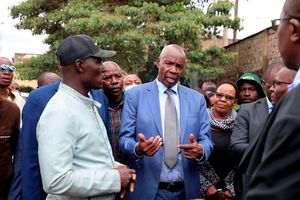
The Ethics and Anti-Corruption Commission (EACC) has obtained orders to freeze Sh643.2 million in unexplained wealth belonging to a junior City Hall employee who earns Sh55,000 per month.
| ShutterstockBusiness
Premium
Exposed: The burden of ‘budgeted graft’
What you need to know:
- With the country already living beyond its means, watchdog reports continue to lay bare the wanton wastage and brazen looting that is enriching a few elites and burdening a majority with punitive taxes.
- The latest scandal is the revelation that the Teachers Service Commission (TSC) paid Sh466.89 million in salaries to dead or retired teachers.
Audit reports continue to uncover wastage of taxpayers’ money running into billions of shillings even as the government struggles with limited resources and meagre allocations for development.
Revenue collection including Appropriation-in-Aid is projected to increase to Sh3.4 trillion in the 2024/25 financial year, but the total budget for the year is Sh4.1 trillion, including Sh877 billion for development.
With the country already living beyond its means, watchdog reports continue to lay bare the wanton wastage and brazen looting that is enriching a few elites and burdening a majority with punitive taxes.
The latest scandal is the revelation that the Teachers Service Commission (TSC) paid Sh466.89 million in salaries to dead or retired teachers.
Days after the admission, it emerged another Sh412.7 million had been disbursed to learners in various institutions of higher learning for periods exceeding duration of academic programmes.

Teachers Service Commission CEO Nancy Macharia. TSC transferred 17 teachers at St Gabriel Isongo Secondary School to other stations.
MPs have demanded answers as to how such huge amounts of money were wired to non-existent teachers and students, and who benefited from it.
The Auditor General has also routinely flagged payment of commitment fees on loans Kenya is yet to draw, with the latest report by Ms Nancy Gathungu raising concerns of over Sh1.4 billion paid in commitment fees on undrawn amounts.
Documents tabled before the National Assembly’s Public Accounts Committee revealed that TSC paid the millions to teachers who had either died, exited the commission, resigned or absconded duty during the financial year ending June 30, 2022 as flagged by Auditor-General Nancy Gathungu.
TSC chief executive officer Ms Nancy Macharia, however, blamed the salary overpayment on system delay.
“Salary overpayment occurred as a result of a delay in stoppage of salary of employees upon death, desertion of duty, resignation, transfer of service, transfer, sick leave, interdiction and absenteeism,” said Ms Macharia.
The ghost workers scheme through which billions are siphoned as salaries for phony government employees continues at the national and county governments.
Last month, the Public Service Commission (PSC) reported an excess of 19,467 members of staff recorded in the staff registers against those reported in the approved filled vacancies.
The ghost workers are estimated to cost Kenyan taxpayers as much as Sh5.7 billion every financial year. It could also be a ploy to create room for more illegal hiring.
“The number of staff in the staff registers did not tally with the number of vacancies filled. The unexplained variance could create room for unauthorised recruitment of staff,” PSC states in a report dated December 2023.
An investigation into the looting of Sh35 billion through ghost workers in the counties since 2013 has stalled at the Senate.
In 2014, a biometric headcount of civil servants exposed 12,000 ghost workers — those who did not physically present themselves at registration centres — and they were subsequently removed from the payroll.
The same year, the Capacity Assessment and Rationalisation of the Public Service (Carps) programme — a joint effort of national and county governments — found that counties had 126,998 workers.
But when the National Cohesion and Integration Commission (NCIC) did an ethnic audit of counties, which was finished in August 2015, it recorded 116,852 workers in devolved units.
Recently, Controller of Budget Margaret Nyakang’o exposed inflation of salaries of top State officers in excess of Sh1 billion over the years through what she termed as “budgeted corruption”.
Dr Nyakang’o detailed how the Treasury has been over-budgeting salaries of senior government officials through the Consolidated Fund Services (CFS).

In the financial year ending June 2023, for instance, Treasury originally budgeted her annual salary as Sh17.82 million, prompting her office to raise concerns as the figure was way above what she was taking home annually.
Treasury reduced the amount to Sh10.15 million which was still higher than her Sh9.18 million annual salary.
Exposing the extent of wasteful expenditure by the national government, Dr Nyakang’o said such inflated salary budgets cut across senior government officials paid through the CFS.
“The exaggerations are in the National Treasury and let me give just one example. I found out my salary was budgeted for at three times what I am paid,” said Dr Nyakang’o.
“I am the only State officer there and so there is nothing like confusion there. It was like that for all the other State officers. So I asked them why the budget is showing three times what my annual salary is. I have not received an answer to date,” she said during submissions to the national dialogue committee.
Key senior State officers paid through the CFS include the President and his deputy, the Auditor General, the IEBC chairperson, vice chairperson and Commissioners, the Director of Public Prosecutions, and the Attorney General among others.
According to the latest national government budget implementation review report for the first six months of the fiscal year ending June 30, 2024, released last week, State and Constitutional offices had a budget of Sh4.7 billion but had only spent Sh1.6 billion by mid-year, translating to only 34 per cent of the budget, signaling allocation of resources not per need.
The report showed that the discrepancies between the original budget and the actual salaries for State officers under CFS in the financial year ending June 2024 add up to over Sh1.5 billion, monies whose trail Dr Nyakang’o said cannot be traced.
In July 2023, Dr Nyakang’o accused the executive of using supplementary budgets to sneak in illegal expenditure resulting in the loss of public funds.
“The frequent changes are mostly illegal and irregular. Most agencies allocate money to one item and later distribute the funds to other projects that are not approved,” she said.

Integrity Centre in Nairobi which houses the Ethics and Anti-Corruption Commission headquarters.
However, she is not the first holder of a key public accountability office to publicly talk about ‘budgeted corruption’ in Kenya.
In May 2019, then Auditor-General Edward Ouko also spoke of the practice through which the budget is inflated by monies that are earmarked to be stolen.
“From where I sit, I would bring in the theory of budgeted corruption… Is our budget actually loaded with corruption? It fits the theory of a highway which has many exit lanes, and corrupt individuals know how to manipulate these exit lanes,” Mr Ouko said.
During his tenure in office, President Uhuru Kenyatta once said the government loses Sh2 billion daily to theft.
Other avenues for brazen squandering of public funds are refurbishment of buildings and court awards to contractors for breach of contract.

In a petition to Parliament last year, fraud risk management consultant Bernard Muchere questioned allocations over the years in excess of Sh1.2 billion to refurbish Bima House and Herufi House.
Mr Muchere, a retired government auditor, had flagged a number of suspect allocations running into billions for recurrent expenditure items such as refurbishing offices, airtime, travel and training.
He cited one State department that had spent Sh753 million refurbishing a building in the last three years and had requested an additional Sh200 million last year.
He argued the amount was enough to purchase or construct an office.
On delays to settle court awards, Auditor General Nancy Gathungu, for instance, cites Sh91 million that Treasury incurred as interest for delayed payment of an award to a contractor.
“An amount of Sh327,192,575 which included interest of Sh91,509,575 was awarded on 21 October, 2022. Had the ministry paid the bill when it fell due, the interest charged of Sh91,509,575 and legal costs awarded of Sh5,765,160 would have been avoided. Further, delay in settlement of the bill subjects the Ministry to further interest charges,” says the report of the auditor-general on the national government ministries, departments and agencies for the year 2022/2023.
Highlights
- At least Sh35 billion paid to non-existent staffers in counties between 2013 and 2022.
- Some Sh5.7 billion lost annually by the national government to ghost workers.
- Sh1.4 billion paid in commitment fees on undrawn loans.
- At least Sh1.5 billion in inflated salaries of State officers paid through the Consolidated Fund Services
- TSC paid Sh466.9 million to teachers who were no longer in service in the financial year ended June 30, 2022.
- Sh412.7 million for some 9,489 students for periods exceeding the duration of academic programmes between the financial year ending June 2017 and 2023.





